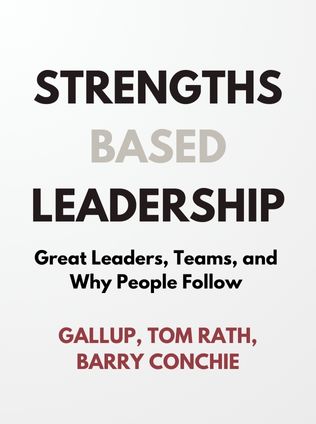
Strengths Based Leadership
Great Leaders, Teams, and Why People Follow
By Gallup, Tom Rath, and Barry Conchie
Published 01/2007
About the Author
Tom Rath and Barry Conchie, the authors of Strengths Based Leadership, have spent their careers delving into the intricacies of leadership and team dynamics. Tom Rath, a seasoned workplace researcher, has been a pivotal figure in Gallup, a renowned business research and consulting firm. He is also the author of several New York Times bestsellers, including StrengthsFinder 2.0 and How Full Is Your Bucket?. Rath’s work has primarily focused on how individuals can harness their strengths to achieve personal and professional success. Barry Conchie, on the other hand, is a business consultant who has played a significant role in Gallup’s executive leadership consulting program as a Senior Scientist. Together, they bring a wealth of knowledge and experience to the table, challenging traditional notions of leadership and advocating for a strengths-based approach.
Main Idea
The central thesis of Strengths Based Leadership is that the most effective leaders are those who focus on their personal strengths while assembling a team that complements their weaknesses. Rath and Conchie argue against the conventional wisdom that leaders should strive to be well-rounded. Instead, they present compelling evidence, gathered from interviews with 20,000 leaders and 10,000 employees worldwide, that suggests the best leaders are those who maximize their natural talents and build a balanced team around them. By focusing on strengths, both leaders and their teams can achieve higher productivity, satisfaction, and success.
Table of Contents
- Introduction
- The Four Leadership Qualities
- Maximizing Your Strengths
- Objections to the Strengths-Based Approach
- Know Your Strengths and Stick to Them
- The Four Strengths Categories
- Executing
- Influencing
- Relationship-Building
- Strategic Thinking
- Conclusion
Introduction
In the world of leadership, the notion that one must be a jack-of-all-trades is deeply ingrained. Leaders are often expected to excel in every area, from strategic thinking to relationship-building, from executing plans to influencing others. However, Rath and Conchie turn this idea on its head. They argue that attempting to be proficient in every aspect of leadership is not only unrealistic but also counterproductive. Instead, they advocate for a strengths-based approach, where leaders focus on their natural talents and build a team that complements their weaknesses. This approach, they argue, not only leads to personal fulfillment but also creates more effective and resilient teams.
The Four Leadership Qualities
Before diving into the strengths-based approach, it’s crucial to understand the foundational qualities that Rath and Conchie believe all leaders should possess. These qualities—caring, honesty, steadiness, and optimism—form the bedrock of effective leadership. They are the traits that command respect and loyalty from followers, and without them, even the most talented leaders may struggle to inspire and lead their teams.
Sign up for FREE and get access to 1,400+ books summaries.
You May Also Like
The Subtle Art of Not Giving a F*ck
A Counterintuitive Approach to Living a Good Life
By Mark MansonRich Dad Poor Dad
What the Rich Teach Their Kids About Money - That the Poor and Middle Class Do Not!
By Robert T. KiyosakiHow To Win Friends and Influence People
The All-Time Classic Manual Of People Skills
By Dale CarnegieQuiet: The Power of Introverts
The Power of Introverts in a World That Can't Stop Talking
By Susan Cain



















